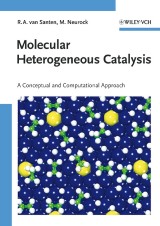Details

Molecular Heterogeneous Catalysis
A Conceptual and Computational Approach1. Aufl.
|
165,99 € |
|
| Verlag: | Wiley-VCH |
| Format: | |
| Veröffentl.: | 10.06.2009 |
| ISBN/EAN: | 9783527608348 |
| Sprache: | englisch |
| Anzahl Seiten: | 488 |
DRM-geschütztes eBook, Sie benötigen z.B. Adobe Digital Editions und eine Adobe ID zum Lesen.
Beschreibungen
An integrated approach to the molecular theory of reaction mechanism in heterogeneous catalysis, largely based on the knowledge among the growing theoretical catalysis community over the past half century, and covering all major catalytic systems. The authors develop a general conceptual framework, including in-depth comparisons with enzyme catalysis, biomineralisation, organometallic and coordination chemistry. A chapter dedicated to molecular electrocatalysis addresses the molecular description of reactions at the liquid-solid interphase, while studies range from a quantum-chemical treatment of individual molecular states to dynamic Monte-Carlo simulations, including the full flexibility of the many-particle systems. Complexity in catalysis is explained in chapters on self-organization and self-assembly of catalysts, and other sections are devoted to evolutionary, combinatorial techniques as well as artificial chemistry.
1 Introduction<br> 2 Principles of Molecular Heterogeneous Catalyis<br> 3 The Reactivity of Transition-Metal Surfaces<br> 4 Shape Selective Microporous Catalysts, the Zeolithes<br> 5 Catalysis by Oxides and Sulfides<br> 6 Mechanisms for Aqueous Phase Heterogeneous Catalysis and Electrocatalysis<br> 7 Mechanisms in Biocatalysis. Relationship with Chemocatalysis<br> 8 Self Organization and Self Assembly of Catalytic Systems<br> 9 Heterogeneous Catalysis and the Origin of Life, Biomineralization<br> 10 Postscript<br> Appendix
"This book provides a comprehensive overview of current ideas in the rapidly developing field of molecular heterogeneous catalysis...The book would be especially suitable for graduate-level students and researchers working in heterogeneous catalysis, but anyone with an interest in molecular-level science would find this book appealing." <br> Angewandte Chemie<br>
Rutger Anthony van Santen gained his doctorate in theoretical chemistry in 1971, from the University of Leiden, joining Shell, Amsterdam as a research chemist the following year. In 1988 he became Professor of Catalysis at the Eindhoven University of Technology where he was promoted to scientific director in 1989. In 1991 he became director of the Netherlands Institute of Research in Catalysis, and in 2005 he was made Royal Netherlands Academy of Science and Arts Professor. He is a member of the Royal Dutch Academy of Arts and Sciences, Dutch Academy of Engineering and is a Knight in the order of the Dutch Lion. Professor van Santen has been active in many national and international catalysis research programs and organizations. He is the author or editor of 11 books, over 600 research papers and 16 patents, and has been awarded several national and international awards and visiting professorships. His main research interest is the molecular mechanistic understanding of catalytic reactions. <br> <br> <br> Matthew Neurock gained his PhD in Chemical Engineering from the University of Delaware in 1992, joining the Schuit Institute of Catalysis, Eindhoven University of Technology, as a postdoctoral fellow one year later. In 1995 he was made Assistant Professor of Chemical Engineering at the University of Virginia, becoming a full professor in <br> 2003. He has been active in national as well as international organizations and has co-authored over 130 papers and 2 patents. He is a recipient of the NSF Career Young Faculty Development Award, the Dupont Young Faculty Award and the Ford Young Faculty Award. Professor Neurock's research is focused on modeling the atomic features and molecular phenomena that govern catalysis and materials processing to help elucidate catalytic reaction mechanisms on metal and oxide surfaces, understand active sites as they exist in realistic and complex reaction environments and aid in the design of catalytic materials.
An integrated approach to the molecular theory of reaction mechanism in heterogeneous catalysis, derived from the recent advances in the growing field of theoretical catalysis. The authors develop a general conceptual framework for understanding catalysis and present in-depth comparisons between heterogeneous catalytic systems with those found in enzyme catalysis, biomineralization, organometallic chemistry and coordination chemistry. They describe the mechanistic features that control different catalytic materials and systems, such as metals, bimetallics, zeolites, metal oxides, metal sulfides and molecular complexes. The emerging field of electrocatalysis for fuel cells and electrochemical conversion processes is also introduced and compared with classical heterogeneous catalysis. The book presents the results from a broad range of computation methods, including ab initio quantum mechanical approaches, Monte Carlo methods and molecular dynamics. Finally, complexity in catalysis is explained in chapters on self-organization and self-assembly of catalysts, while the final section are devoted to evolutionary, combinatorial techniques as well as artificial chemistry.


















